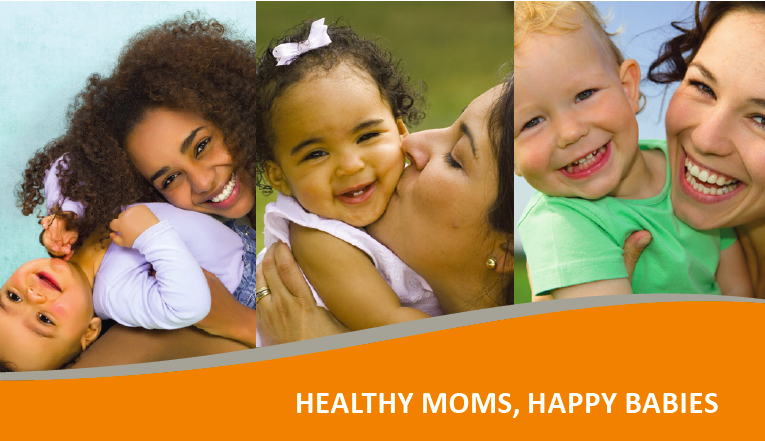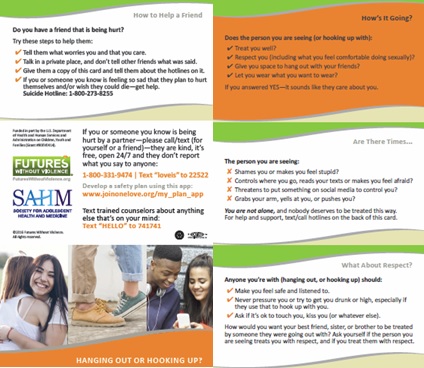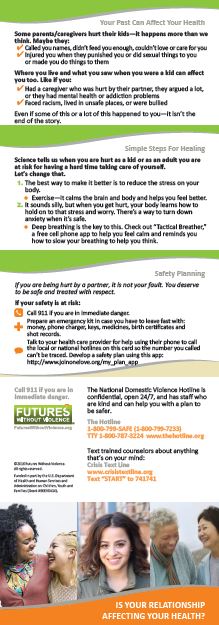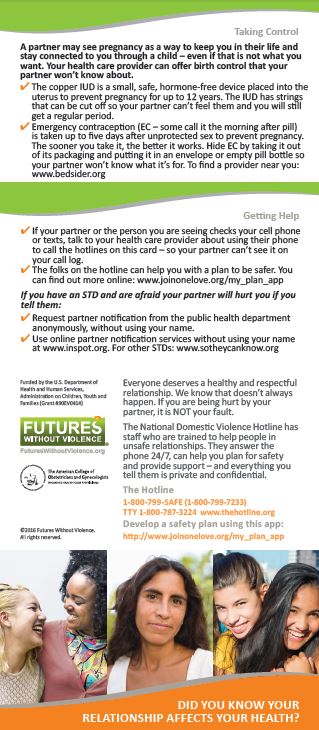 We Are Worthy is a safety card for women and girls of reproductive age who live in Alaska, including those from Alaska Native villages. The card may be distributed by health care providers, social service providers, advocates, health teachers, and others as part of routine care, or as part of advocacy support, or educational groups. In addition to providing information, positive messages, and safety resources for women, this tool also functions as a prompt for health and behavioral health care providers by providing quick phrases to improve discussions with women about the impact of relationship violence and sexual violence on their overall health and the health of their pregnancies and children.
We Are Worthy is a safety card for women and girls of reproductive age who live in Alaska, including those from Alaska Native villages. The card may be distributed by health care providers, social service providers, advocates, health teachers, and others as part of routine care, or as part of advocacy support, or educational groups. In addition to providing information, positive messages, and safety resources for women, this tool also functions as a prompt for health and behavioral health care providers by providing quick phrases to improve discussions with women about the impact of relationship violence and sexual violence on their overall health and the health of their pregnancies and children.
This card was co-created with the Alaska Native Tribal Health Consortium and the Alaska Family Violence Prevention Project, and is based on feedback from (primarily) Alaska Native and American Indian women and girls from many rural villages, small towns, and cities in Alaska. The safety card outlines questions women may ask themselves about their relationships, their sexual and reproductive rights, how relationships may influence their health such as with substance use, depression, and drinking during pregnancy. It does this while offering supportive messages that a woman who is experiencing these things is not alone, and while providing referrals to national support services for help. Although developed in Alaska, the content applies for a national audience. Additional versions are available that include Alaska region-specific DV shelter numbers. This 4-panel double sided tool folds up to the size of a business card (3.5″ x 2″).
To request hard copies, please visit: www.anthc.org (Alaska Native Tribal Health Consortium) or email a request to Jo Gottschalk at Jo.gottschalk@alaska.gov.
Download the PDF now!

 Healthy Moms, Happy Babies is a poster co-branded by the American College of Obstetricians and Gynecologists and accompanies the perinatal safety card. The poster sends the message that babies and kids thrive when their moms thrive. Moms thrive in healthy relationships—ones that are respectful, nurturing and caring. The poster encourages people to talk to their health care provider and view the Healthy Moms, Happy Babies safety card for further information about healthy relationships and domestic violence. Toll-free numbers are also listed for the National Hotline on Domestic Violence and National Teen Dating Abuse hotline. Available in three versions featuring a pregnant African American woman and daughter (English); a pregnant Caucasian woman and son (English) and a third with a pregnant Latina woman and son (Spanish). The poster is 11″x17″.
Healthy Moms, Happy Babies is a poster co-branded by the American College of Obstetricians and Gynecologists and accompanies the perinatal safety card. The poster sends the message that babies and kids thrive when their moms thrive. Moms thrive in healthy relationships—ones that are respectful, nurturing and caring. The poster encourages people to talk to their health care provider and view the Healthy Moms, Happy Babies safety card for further information about healthy relationships and domestic violence. Toll-free numbers are also listed for the National Hotline on Domestic Violence and National Teen Dating Abuse hotline. Available in three versions featuring a pregnant African American woman and daughter (English); a pregnant Caucasian woman and son (English) and a third with a pregnant Latina woman and son (Spanish). The poster is 11″x17″.
 This poster was designed for display in a range of health sites serving adolescents including school-based health centers, school nurses offices, teen clinics, and pediatricians offices. The poster identifies aspects of both healthy and unhealthy relationships, encourages talking to a health care provider if the reader or someone they know has questions or is experiencing abuse.
This poster was designed for display in a range of health sites serving adolescents including school-based health centers, school nurses offices, teen clinics, and pediatricians offices. The poster identifies aspects of both healthy and unhealthy relationships, encourages talking to a health care provider if the reader or someone they know has questions or is experiencing abuse.











 Hanging Out or Hooking Up is a safety card for teens. The card challenges all teens to consider how their partner treats them, identifying dynamics of healthy relationships and signs that may indicate abuse. The card also explores how to confront excessive text messaging and identifies dynamics of consensual versus pressured sex including the ability to use birth control. Tips are provided to those wanting to support a friend who may be facing relationship abuse.
Hanging Out or Hooking Up is a safety card for teens. The card challenges all teens to consider how their partner treats them, identifying dynamics of healthy relationships and signs that may indicate abuse. The card also explores how to confront excessive text messaging and identifies dynamics of consensual versus pressured sex including the ability to use birth control. Tips are provided to those wanting to support a friend who may be facing relationship abuse.



 (Un) Heard Voices is based on the results of a focus group with Asian immigrant women and Asian American women from different backgrounds.
(Un) Heard Voices is based on the results of a focus group with Asian immigrant women and Asian American women from different backgrounds.
 The Robert Wood Johnson Foundation solicited the assistance of the Futures Without Violence (FWV) to collect information on the challenges, prevention and treatment of intimate partner violence (IPV) in immigrant and refugee communities.
The Robert Wood Johnson Foundation solicited the assistance of the Futures Without Violence (FWV) to collect information on the challenges, prevention and treatment of intimate partner violence (IPV) in immigrant and refugee communities.




















 This small safety card was designed for family planning and reproductive health settings. The card prompts patients to ask themselves whether they are in a healthy relationship or if they have experienced reproductive coercion—forced sex, birth control sabotage, forced pregnancy, or violence—by an intimate partner. The card is designed to help women recognize how their intimate relationships may impact their reproductive health and their children’s health, while providing information for safety planning and referral.
This small safety card was designed for family planning and reproductive health settings. The card prompts patients to ask themselves whether they are in a healthy relationship or if they have experienced reproductive coercion—forced sex, birth control sabotage, forced pregnancy, or violence—by an intimate partner. The card is designed to help women recognize how their intimate relationships may impact their reproductive health and their children’s health, while providing information for safety planning and referral.



